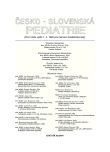-
Medical journals
- Career
Newborn Screening for Cystic Fibrosis in the Czech Republic: Results of a Pilot Study
Authors: A. Holubová 1*; M. Balaščaková 1*; V. Skalická 2; P. Kračmar 3; T. Piskáčková 1; V. Vávrová 2; D. Zemková 2; L. Gonsorčíková 3; J. Lebl 2; M. Macek ml. 1; F. Votava 3
Authors‘ workplace: Ústav biologie a lékařské genetiky UK 2. LF a FN Motol, Praha přednosta prof. MUDr. M. Macek ml., DrSc. 1; Pediatrická klinika UK 2. LF a FN Motol, Praha přednosta prof. MUDr. J. Lebl, CSc. 2; Klinika dětí a dorostu UK 3. LF a FN Královské Vinohrady, Praha přednosta doc. MUDr. F. Votava, PhD. 3
Published in: Čes-slov Pediat 2007; 62 (4): 187-195.
Category: Original Papers
Overview
Early diagnosis of cystic fibrosis (CF) is considered as a favorable prognostic factor and as a hallmark of a properly functioning health care system. During the last decade evidence for deterioration of early clinical diagnosis of CF in the Czech Republic became evident. This alarming fact led us to commence a CF newborn screening (NBS) pilot project in order to assess its feasibility as an efficient tool for uniform and early diagnosis of CF in our country. Concentrations of immunoreactive trypsin (IRT) in dried blood spots (Guthrie cards) were examined in 76438 newborns born between 1. 2. 2005 and 2. 11. 2006 within a region comprising 62% of the entire Czech population. IRT concentration of 75 ng/ml and higher was found in 799 newborns, i.e. 1.05% of the total. Since these newborns were considered at high risk of CF and panels of population specific mutations of the gene CFTR were analysed from respective blood spots. The five most common mutations of gene CFTR (comprising 83.8% of alleles in CF patients in CR) were investigated if the concentration of IRT was within the range of 75–150 ng/ml. In addition, 38 CFTR gene mutations (comprising 90.8% of CF alleles in CR) were examined in blood spots where the concentration of IRT was more than 150 ng/ml and/or if one CFTR gene mutation was found in a dried blood spot with a lower IRT concentration.
Two CFTR gene mutations were found in 11 newborns, confirming the diagnosis of CF. A single CFTR mutation was found in 53 newborns. All such cases were subjected to sweat testing, which was finished in all but 6 newborns. The sweat test was positive (Cl- level >60 mmol/l) in one newborn with one CFTR gene mutation, in one newborn borderline levels were detected (Cl- level 30–40 mmol/l, which indicated his long-term follow-up) and in other 45 newborns the sweat test was negative (Cl- level <30 mmol/l) – unaffected carries. Over the course of our project 12 infants were diagnosed as having CF. The median of age at diagnosis was 37 days. Interestingly, 4 of these cases were diagnosed clinically prior the results of NBS. If data of NBS would have been used alone the extrapolated incidence of the disease (1 : 6369 newborns) was surprisingly lower than that established epidemiologically (1 : 2736 newborns). This discrepancy could be explained by:
1. a relatively small number of examined newborns, i.e. error due to a small number of studied subjects;
2. false negativity of utilised screening algorithm, which is however unlikely;
3. impact of prenatal diagnosis where parents have opted for selected termination of pregnancy.
Authors conclude that the NBS for CF in conditions of the Czech Republic is an effective tool for early and broad based diagnosis of CF. It also complements the current deterioration of early clinical diagnosis of the disease. Nevertheless, an unanswered question remains if really all cases of incident CF were ascertained, which necessitates further studies.Key words:
cystic fibrosis (OMIM 219700), newborn screening, immunoreactive trypsin/ trypsinogen, CFTR gene, molecular genetic testing
Labels
Neonatology Paediatrics General practitioner for children and adolescents
Article was published inCzech-Slovak Pediatrics

2007 Issue 4-
All articles in this issue
- Newborn Screening for Cystic Fibrosis in the Czech Republic: Results of a Pilot Study
- The Occurrence of Inborn Heart Defects and their Prenatal Detection in the Moravian-Silesian Region
- The Muscle-bone Relationship in Cystic Fibrosis Patients
- Insulin Resistance in Children and Adolescents
- Langerhans’ Cell Histiocytosis in Children – Clinical Presentation, Diagnosis and Contemporary Therapeutic Options
- Prenatal Corticosteroids and Their Effects on the Fetus and Newborn Infant: Known and Secret
- Duchenne Muscular Dystrophy in a Girl
- Peracute Tumor Lysis Syndrome in the Course of Unrecognized Mediastinal Non-Hodgkin’s Lymphoma in Nine-years Old Boy. A Case report
- Czech-Slovak Pediatrics
- Journal archive
- Current issue
- Online only
- About the journal
Most read in this issue- Prenatal Corticosteroids and Their Effects on the Fetus and Newborn Infant: Known and Secret
- Duchenne Muscular Dystrophy in a Girl
- Newborn Screening for Cystic Fibrosis in the Czech Republic: Results of a Pilot Study
- Langerhans’ Cell Histiocytosis in Children – Clinical Presentation, Diagnosis and Contemporary Therapeutic Options
Login#ADS_BOTTOM_SCRIPTS#Forgotten passwordEnter the email address that you registered with. We will send you instructions on how to set a new password.
- Career

